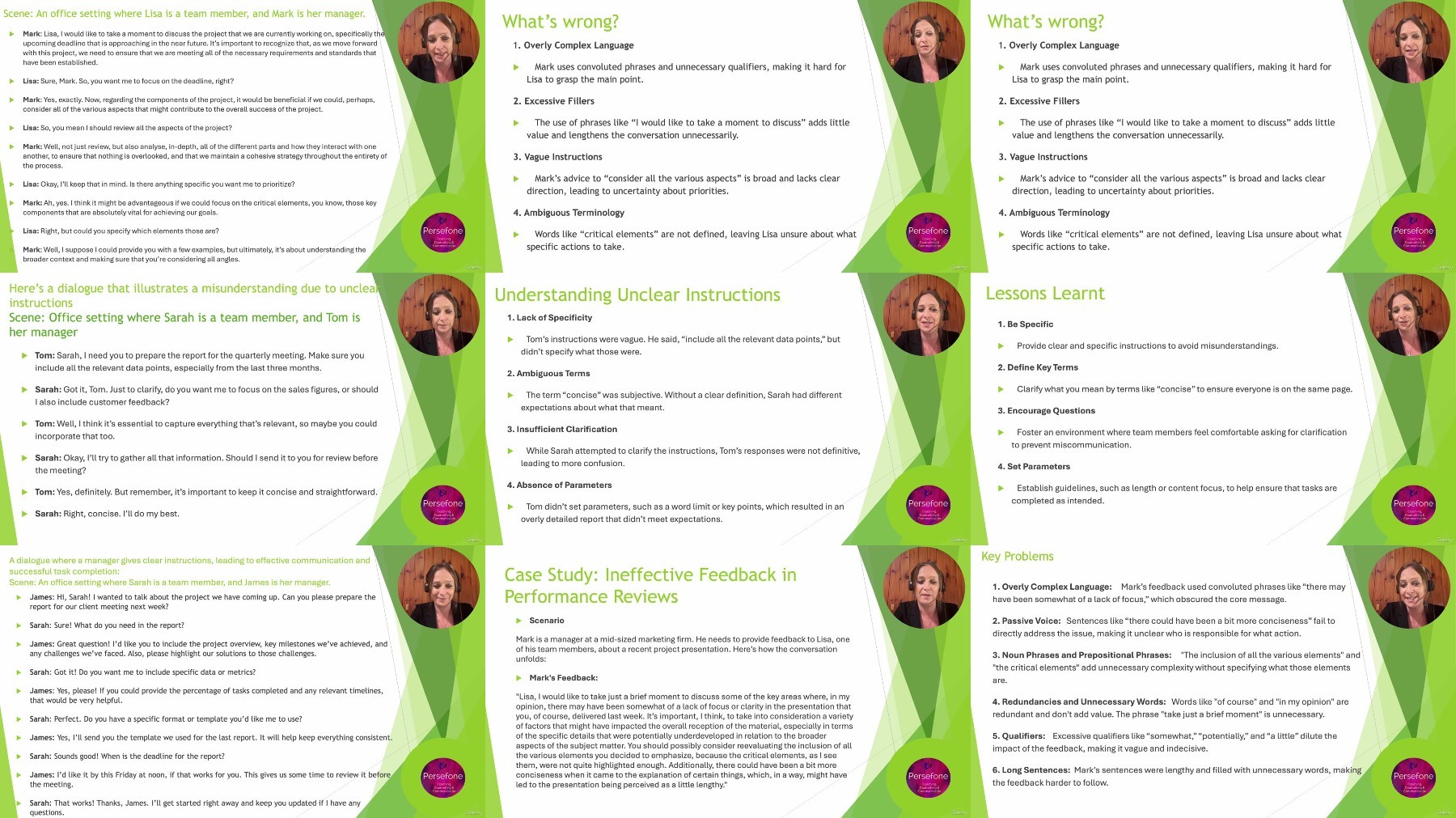Clear and Concise Communication for Professionals

Clear and Concise Communication for Professionals
Published 10/2024
Duration: 1h44m | .MP4 1280x720, 30 fps(r) | AAC, 44100 Hz, 2ch | 1.73 GB
Genre: eLearning | Language: English
Mastering the Art of Streamlined and Effective Professional Communication
What you'll learn
Develop the ability to communicate ideas clearly and effectively by eliminating unnecessary words and redundant information.
Master techniques for structuring sentences and paragraphs logically to improve clarity and readability in both written and spoken communication.
Build confidence in delivering clear and concise verbal communication during presentations, meetings, and everyday interactions.
Apply principles of concise communication to professional writing, including emails, reports, and proposals.
Develop strategies for simplifying complex ideas without losing meaning, making them easier for audiences to understand.
Explore various English grammar structures that will enhance your communication skills
Requirements
At least an upper-intermediate (B2) understanding of English is needed
Description
In today's fast-paced world, the ability to communicate clearly and concisely is a critical skill for success in any professional environment. This course is designed to help
Mother-tongue and non-native English speaking professionals
refine their communication by eliminating unnecessary words, simplifying complex ideas, and structuring information for maximum impact. Participants will learn to deliver clear, straightforward messages that resonate with their audience, whether in written reports, emails, presentations, or verbal exchanges.
Through
practical exercises, real-world examples, and focused coaching
, this course will cover key strategies for streamlining languageand applying clarify principles to business settings. By the end of the course, participants will be able to craft communication that is direct, persuasive, and effective, enabling them to connect more easily with colleagues, clients, and stakeholders.
Key Takeaways:
1.
Master Sentence Structure and Word Order
: Learn to organise sentences for clarity, using straightforward subject-verb-object arrangements to enhance readability.
2.
Utilise Active Voice
: Shift from passive to active voice to create more direct and engaging communication that emphasises the subject's actions.
3.
Eliminate Unnecessary Information
: Develop the skill to identify and remove obvious or redundant details that do not add value to your message.
4.
Remove Qualifiers
: Strengthen your writing by eliminating qualifiers (e.g., "very," "somewhat") that dilute the impact of your statements.
5.
Choose Verbs Over Nouns
: Emphasise strong verbs instead of relying on noun forms to create more dynamic and compelling sentences.
6.
Avoid Redundancies
: Recognise and eliminate repetitive phrases to streamline your communication and maintain audience engagement.
7.
Limit Prepositional Phrases
: Simplify sentences by reducing the number of prepositional phrases, focusing on clarity and directness.
8.
Frame Positives Instead of Negatives
: Communicate more effectively by expressing ideas in positive terms, making your messages more constructive and engaging.
9.
Employ Parallel Structures
: Use parallelism in your writing to create rhythm and balance, enhancing readability and comprehension.
This course is ideal for professionals looking to enhance their communication skills and build stronger, more efficient interactions in their work environment.
Who this course is for:
Advanced learners of English as a second language who want to refine their communication for professional or academic purposes.
Government workers, policy makers, and public administrators who need to communicate clearly with both internal teams and the public.
Researchers and students who need to communicate complex ideas in papers, presentations, and discussions.
Managers, team leaders, executives, and business professionals who regularly communicate through reports, presentations, and meetings.
Frontline staff who need to communicate clearly with clients and solve problems efficiently.
More Info

What you'll learn
Develop the ability to communicate ideas clearly and effectively by eliminating unnecessary words and redundant information.
Master techniques for structuring sentences and paragraphs logically to improve clarity and readability in both written and spoken communication.
Build confidence in delivering clear and concise verbal communication during presentations, meetings, and everyday interactions.
Apply principles of concise communication to professional writing, including emails, reports, and proposals.
Develop strategies for simplifying complex ideas without losing meaning, making them easier for audiences to understand.
Explore various English grammar structures that will enhance your communication skills
Requirements
At least an upper-intermediate (B2) understanding of English is needed
Description
In today's fast-paced world, the ability to communicate clearly and concisely is a critical skill for success in any professional environment. This course is designed to help
Mother-tongue and non-native English speaking professionals
refine their communication by eliminating unnecessary words, simplifying complex ideas, and structuring information for maximum impact. Participants will learn to deliver clear, straightforward messages that resonate with their audience, whether in written reports, emails, presentations, or verbal exchanges.
Through
practical exercises, real-world examples, and focused coaching
, this course will cover key strategies for streamlining languageand applying clarify principles to business settings. By the end of the course, participants will be able to craft communication that is direct, persuasive, and effective, enabling them to connect more easily with colleagues, clients, and stakeholders.
Key Takeaways:
1.
Master Sentence Structure and Word Order
: Learn to organise sentences for clarity, using straightforward subject-verb-object arrangements to enhance readability.
2.
Utilise Active Voice
: Shift from passive to active voice to create more direct and engaging communication that emphasises the subject's actions.
3.
Eliminate Unnecessary Information
: Develop the skill to identify and remove obvious or redundant details that do not add value to your message.
4.
Remove Qualifiers
: Strengthen your writing by eliminating qualifiers (e.g., "very," "somewhat") that dilute the impact of your statements.
5.
Choose Verbs Over Nouns
: Emphasise strong verbs instead of relying on noun forms to create more dynamic and compelling sentences.
6.
Avoid Redundancies
: Recognise and eliminate repetitive phrases to streamline your communication and maintain audience engagement.
7.
Limit Prepositional Phrases
: Simplify sentences by reducing the number of prepositional phrases, focusing on clarity and directness.
8.
Frame Positives Instead of Negatives
: Communicate more effectively by expressing ideas in positive terms, making your messages more constructive and engaging.
9.
Employ Parallel Structures
: Use parallelism in your writing to create rhythm and balance, enhancing readability and comprehension.
This course is ideal for professionals looking to enhance their communication skills and build stronger, more efficient interactions in their work environment.
Who this course is for:
Advanced learners of English as a second language who want to refine their communication for professional or academic purposes.
Government workers, policy makers, and public administrators who need to communicate clearly with both internal teams and the public.
Researchers and students who need to communicate complex ideas in papers, presentations, and discussions.
Managers, team leaders, executives, and business professionals who regularly communicate through reports, presentations, and meetings.
Frontline staff who need to communicate clearly with clients and solve problems efficiently.
More Info

